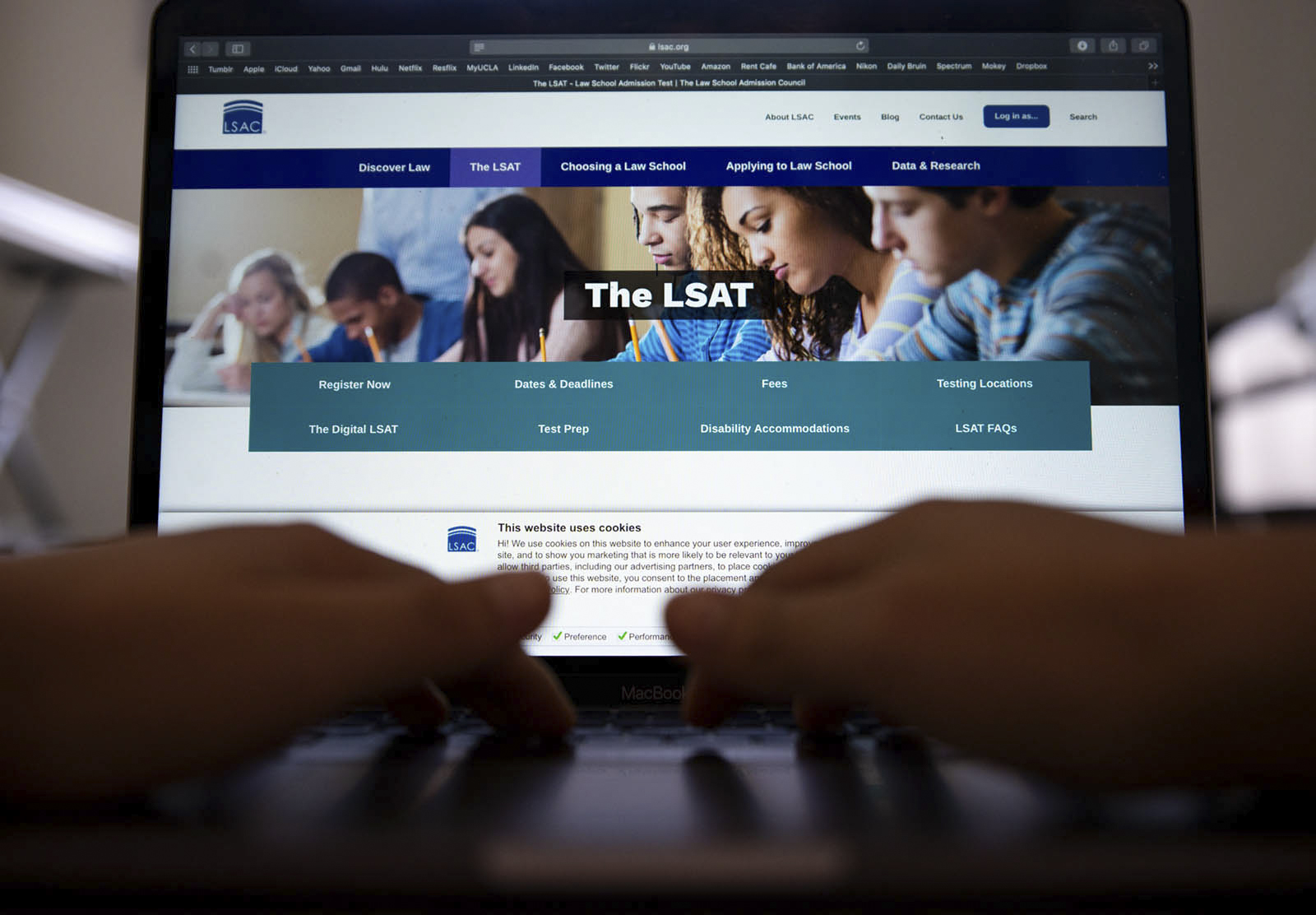LSAT to be made more accessible for visually impaired students after lawsuit

A legally blind student filed a lawsuit against the organization that runs the LSAT, the Law School Admissions Council, in May 2017 after the organization denied his request to skip the Analytical Reasoning section of the LSAT. LSAC is now researching different ways to test analytical reasoning. (Sim Beauchamp/Daily Bruin)
By Kalysa To
Oct. 23, 2019 12:29 a.m.
The analytical reasoning portion of the Law School Admission Test will be redesigned following a recent settlement with a legally blind test taker.
Angelo Binno, who is legally blind, filed a lawsuit against the Law School Admission Council in May 2017 after the organization denied his request to skip the Analytical Reasoning section of the LSAT, according to a press release from Nyman Turkish PC, the law firm representing Binno.
Following an Oct. 7 settlement with Binno, the LSAC will be looking for a new, more accessible way of assessing analytical reasoning.
According to the press release, Binno’s near-point visual impairment prevented him from drawing diagrams for the AR section.
Shelesha Taylor, who also has significant visual impairment, later joined the lawsuit as an additional plaintiff.
The lawsuit was filed in a Michigan federal court, where Binno claimed the LSAC’s denial of a waiver of the AR section violated the Americans with Disabilities Act and the Michigan Persons with Disabilities Civil Rights Act.
The Americans with Disabilities Act, established in 1990, protects people with disabilities against discrimination in all areas of public life. The Michigan Persons with Disabilities Civil Rights Act of 1976 defines the rights of and prohibits discrimination against people with disabilities.
The suit was settled Oct. 7, with Binno, Taylor and the LSAC agreeing to work together to enhance accessibility and opportunities for visually impaired test-takers.
Following the settlement, the LSAC is researching and developing other ways of testing analytical reasoning, Kristin Marcell, the director of content marketing at the LSAC, said in an email statement.
Marcell added the LSAC will also work with Binno and Taylor to identify additional accommodations that should be made to the test.
“Because analytical reasoning is a critical skill, it is important to recognize that we will continue to assess the analytical reasoning abilities of prospective law students,” Marcell said. “We are simply redesigning the way in which that skill is assessed.”
Within the next four years, test-takers will take an LSAT that does not have the current AR section but that still assesses analytical reasoning skills, Marcell said.
“LSAC’s mission is to expand access to justice by helping to create a legal profession that truly reflects the breadth and diversity of our society,” Marcell said. “As a part of that mission, we are committed to ensuring access and opportunity for everyone, including individuals with disabilities, to pursue their dreams of legal education.”
Kyle Gehrmann, the LSAT content manager of Blueprint, the largest LSAT preparation company in the nation, said Blueprint has many test-takers who are receiving some form of accommodation from the LSAC.
“I think that (the LSAC) are receptive to accommodations,” Gehrmann said. “And I think my impression is that they grant them when they are justified, that they’re not trying to keep people out of accommodations in any way, shape or form.”
Julianne Ortega, president of the Pre-Law Society at UCLA, said she supports the changes to the LSAT.
“I think that accessibility is a huge issue and something that has kind of gone unnoticed for too long in the LSAC, and I’m glad that it’s finally now getting noticed,” the fourth-year English and political science student said. “Finally, now the lawsuits are voting in the favor of students and people that need these accommodations.”
Ortega added that as president of the Pre-Law Society at UCLA, she is concerned that these changes in the LSAT will not be easily reflected in the workshops the organization hosts.
“It’ll be interesting to see the way the LSAT prep companies expand with this change, whether they’re able to … expand or whether they fold,” Ortega said. “But I think that’s definitely a necessary change to have been made.”
Claudia Peña, a UCLA law lecturer, said she believes in universal design — the idea that the test should be fully functional to everyone without any accommodations necessary.
Peña said she thinks this decision from the LSAC is a win for test-takers with disabilities and test-takers in general because she believes the AR section does not do a good job of indicating test-takers’ aptitude for law school.
“It has nothing to do with my intellectual capacity or my aptitude,” Peña said. “It has everything to do with my access to resources. So there’s a class divide on how people perform on standardized testing.”
However, Gehrmann said he thinks the LSAT appropriately assesses skills for law school, and correlates to students’ success in the first year of law school.
“If you think about what the LSAT is really doing, it’s testing whether a person thinks like a lawyer … without them having to know any actual law,” Gehrmann said. “It tests the same skills that lawyers use, but it’s not testing any substantive law that a person who obviously hasn’t been to law school wouldn’t know.”
Peña said she thinks the law school admissions process should be more comprehensive rather than emphasizing a standardized test score too heavily, but commends the LSAC for its decision to make the AR section more accessible.
Gehrmann said he believes the LSAC has been committed to providing accommodations and making the LSAT accessible to all.
“I know that (the LSAC grants) many accommodations for many different kinds of reasons,” Gehrmann said. “And so I think that they’re pretty committed. I don’t know that the test fundamentally needs to change in order to be more accessible.”

